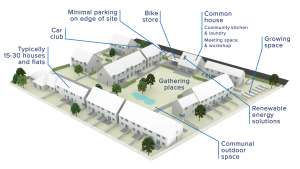Dr Helen Jarvis has worked extensively with the UK Cohousing Network and other Civil Society Organisations (CSO) she tells Dr Eve Forrest about her recent ESRC Impact Acceleration Account (IAA) project and how the cohousing concept could help solve the current housing crisis.
The principles of cohousing are simple: provide individuals with their own private living space, plus access to common areas and shared facilities. Cohousing schemes typically feature a mix of 15-30 houses and flats, designed as connected neighbourhoods that encourage plenty of interaction: including a common house (where neighbours prepare meals and eat together) designed to foster and support the spirit of sharing and togetherness. Key to distinguishing community-led cohousing from commercial brands of ‘co-living’ (such as The Collective, London) is the participatory design process and non-hierarchical resident management structure.
Current research shows various forms of communal housing to be a growing trend, associated with our ageing society, more people living alone, escalating house prices, and shifting lifestyle choices including eco-political awareness. Sharing the financial and practical responsibilities of housing, rather than struggling alone, can make life easier through all stages of life. Residents who are attracted to cohousing know that they can make a difference by sharing housing and community resources with their neighbours. To make this work they have to acquire new skills of collective governance. Combining sustainable buildings with fewer private and more shared goods helps to reduce wasteful consumption too, something we should all start thinking about given the recent statements on the current Climate Emergency.
In the UK, cohousing belongs to a niche sector of community-led housing (CLH) which has begun to effectively organise and lobby the Ministry of Housing, Communities and Local Government (MHCLG) as an umbrella entity: Community Led Homes. CLH brings together Community Land Trusts (CLT) (a legal entity designed to provide and protect locally valued assets), Housing Cooperatives and self-help housing (volunteers rehabilitating empty property), as well as the internationally recognised Cohousing design methodology.
My original research established public dialogue and practitioner engagement on a national scale of policy and planning in England, Wales and Scotland, concluding with a final report presented in Parliament at a launch hosted by Richard Bacon MP. Sector-wide political lobbying was instrumental in securing a record £300 million investment in CLH in 2016 through Government commitment to use the proceeds of extra stamp duty on second home sales to establish a Community Housing Fund. Administered in two waves by Homes England, the Community Housing Fund is intended to help communities build around 6,000 affordable, eco-friendly homes, with grants of up to £75k available to community groups for pre-development revenue costs, plus capital costs for Local Authorities and Registered Providers to help make sites viable for truly affordable non-traditional housing. Sector-wide lobbying also prompted MHCLG sponsorship of further research and evidence to better understand the impact of cohousing on loneliness.
With support from an ESRC IAA I held a ‘focussing event’ for CSOs, civic leaders and housing practitioners to collectively explore local cohousing opportunities. Participants identified common dilemmas of loneliness and isolation, concern to address issues of ageing in place, fuel poverty, environments ill-suited to walking, cycling and inclusive public life, noting that joined-up solutions require us to build communities, not just units of housing. Community-led housing empowers resident groups to create their own ‘people powered’ local housing solutions.
Extensive grassroots engagement via the project helped identify key messages for a short video animation: North East Cohousing Shared Futures, produced in partnership with UK Cohousing Network and Community Led Homes. This resource was made freely available to all interested parties as a tool to ‘demystify’ community-led cohousing for a general audience. The film highlighted the proud tradition of voluntary, community and civil society organising in the North-East as a first step to bridging the gap in knowledge to action. This region faces unique local challenges with rising levels of in-work poverty, loneliness in later life, people and places feeling disconnected. But we can all share stories of a radical past when local communities organised for change – with our once thriving cooperative movement and the knowledge and skills are there to do so again. The North-East, despite hardships, has always had a great tradition of coming together.
All these activities started an ongoing, productive conversation that still continues after the project finished to bring community initiatives and activist groups together and connecting local community groups and spaces. For example, a North-East CLH ‘hub’ has secured Government funding to help provide training and advice to local groups. Moreover, the first elected North of Tyne mayor, Jamie Driscoll, promised ‘genuinely affordable, eco-friendly community-led housing’ as a key pledge in his ambitious manifesto, following consultation with the broad-based CSO Tyne and Wear Citizens.
While the North-East is famous for its radical past and strong support for workers and housing cooperatives in the 1970s, there are currently no inhabited cohousing projects to demonstrate success for the many groups hoping to make CLH a reality on Tyneside. This is likely to change in the near future. Newcastle City Council has recently secured Community Housing Funds to help community groups secure planning permission on brownfield sites in the west end of the city.
Helen’s paper on Community Housing, sharing and togetherness is available here


